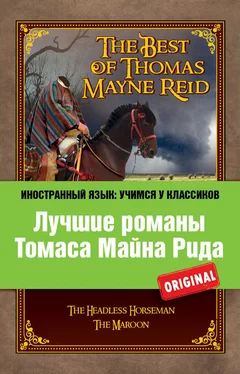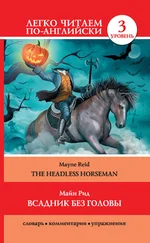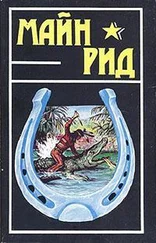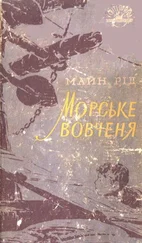A few minutes passed, and a great many minutes – until a full hour had transpired – and still nothing was heard or seen of the book-keeper, though messengers had been dispatched in search of him, and had quartered all the ground for half a mile around the precincts of the penn.
Jessuron – whose matutinal visit to the minister had been postponed by the occurrence – began to look grave.
“It ish shtrange,” said he, speaking to his daughter, who had now arisen, and was far from appearing cheerful; “shtrange he should go abroad in thish fashion, without shaying a word to either of ush!”
Judith made no reply: though her silence could not conceal a certain degree of chagrin, from which she was evidently suffering. Perhaps she had even more reason than the “rabbi” to suspect there was something amiss?
Certainly, something disagreeable – a misunderstanding at least, had arisen between her and Herbert on the preceding day. Her speech had already given some slight hint of it; but much more her manner, which, on the night before, and now unmistakably in the morning, betrayed a mixture of melancholy and suppressed indignation.
It did not add to the equanimity of her temper, when the house wench – who was unslinging the hammock in which Herbert had slept – announced it to contain two articles scarce to be expected in such a place – a cocoa-nut and a tobacco-pipe!
The pipe could not have belonged to Herbert Vaughan: he never smoked a pipe; and as for the cocoa-nut, it had evidently been plucked from the tree standing near. The trunk of the palm exhibited scratches as if some one had climbed up it, and above could be seen the freshly-torn peduncle, where the fruit had been wrenched from its stalk!
What should Herbert Vaughan have been doing up the palm-tree, flinging cocoa-nuts into his own couch?
His unaccountable absence was becoming surrounded by circumstances still more mysterious. One of the cattle-herds, who had been sent in search of him, now coming in, announced a new fact, of further significance. In the patch of muddy soil, outside the garden wall, the herd had discovered the book-keepers track, going up towards the hills; and near it, on the same path, the footprint of another man, who must have gone over the ground twice, returning as he had come!
This cattle-herd, though of sable skin, was a skilled tracker. His word might be trusted.
It was trusted, and produced an unpleasant impression both on Jessuron and Judith – an impression more unpleasant as time passed, and the book-keeper was still unreturned.
The father fumed and fretted; he did more – he threatened. The young Englishman was his debtor, not only for a profuse hospitality, but for money advanced . Was he going to prove ungrateful? A defaulter?
Ah! little had that pecuniary obligation to do with the chagrin that was vexing the Jew Jessuron – far less with those emotions, like the waves of a stormy sea, that had begun to agitate the breast of his daughter; and which every slight circumstance, like a strong wind, was lashing into fury and foam.
Blue Dick came back. He had executed his errand adroitly. The Custos was gone upon a journey; he had started exactly at the hour of daybreak.
“Goot!” said Jessuron; “but where is hish nephew?”
Blue Dick had seen Cynthia; and whispered a word in her ear, as the overseer had instructed him. She would come over to the penn, as soon as she could find an opportunity for absence from Mount Welcome.
“Goot!” answered the Jew. “But where is Mashter Vochan? where hash he betaken himshelf?”
“Where?” mentally interrogated Judith, as the noonday sun saw the black clouds coursing over her brow.
Chapter 4
A Shadowed Spirit
The sun was just beginning to re-gild the glittering flanks of the Jumbé Rock, his rays not yet having reached the valley below, when lights streaming through the jalousied windows of Mount Welcome proclaimed that the inmates of the mansion were already astir.
Lights shone through the lattices of several distinct windows – one from the Custos’ sleeping room, another from the apartment of Lilly Quasheba, while a brilliant stream, pouring through the jalousies in front, betokened that the chandelier was burning in the great hall.
From Smythje’s chamber alone came no sign either of light or life. The windows were dark, the curtains close drawn. Its occupant was asleep.
Yes, though others were stirring around him, the aristocratic Smythje was still sleeping as soundly and silently as if dead, perhaps dreaming of the fair “cweeole queetyaws,” and his twelve conquests now happily extended to the desired baker’s dozen, by the successful declaration of yesterday.
Though a light still burned in the sleeping apartment of the Custos, and also in that of Kate, neither father nor daughter were in their own rooms. Both were in the great hall, seated by a table, on which, even at this early hour, breakfast had been spread. It was not the regular matutinal meal, as certain circumstances showed. Mr Vaughan only was eating; while Kate appeared to be present merely for the purpose of pouring out his coffee, and otherwise attending upon him.
The costume in which the Custos appeared differed from his every-day wear. It was that of a man about to set forth upon a journey – in short, a travelling costume. A surtout, of strong material, with ample outside pockets; boots reaching above his knees; a belt, with pistol holsters, around his waist – a guard against any chance encounter with runaway negroes; a felt hat, lying on a chair beside him, and a camlet cloak, hanging over the back of the same chair – all proclaimed the purpose of a journey, and one about to be entered upon within a few minutes of time.
A pair of large silver spurs buckled over his boots, told also the mode of travel intended. It was to be on horseback.
This was further manifested by the fact that two horses were at that moment standing at the bottom of the stone stairs outside, their forms dimly visible through the blue dawn. Both were saddled, bridled, and equipped, with a black groom by their side, holding them in hand – himself in travelling toggery.
Valises, buckled upon the croup, and saddlebags suspended across the cantle, showed that the travellers were to carry their luggage along with them.
The object of the intended journey is already known. Mr Vaughan was about to put into execution a design long delayed – to perform a duty which he owed to his daughter, and which, if left unaccomplished, would seriously imperil the prosperity and happiness of her future life. He was about proceeding to the capital of the Island, to obtain from the Assembly that special act of grace, which they alone could give; and which would free his daughter from those degrading disabilities the Black Code had inflicted upon all of her unfortunate race. Six lines from the Assembly, with the governors signature attached, though it might not extinguish the taint , nor the taunt of malevolent lips, would, nevertheless, remove all obstacles to hereditament; and Kate Vaughan could then become the heiress to her own father’s property, without fear of failure.
To sue for this act and obtain it was the purpose of that journey upon which Loftus Vaughan was on the eve of setting forth. He had no apprehension of a failure. Had he been only a book-keeper or small tradesman, he might have been less sanguine of success; but, Custos of an important precinct, with scores of friends in the Assembly, he knew that he would only have to ask and it would be given him.
For all that, he was not setting out in very high spirits. The unpleasant prospect of having such a long and arduous journey to make was a source of vexation to him: for the Custos liked an easy life, and hated the fatigue of travel.
Читать дальше
Конец ознакомительного отрывка
Купить книгу











